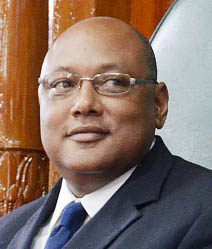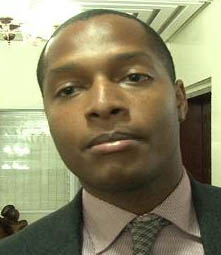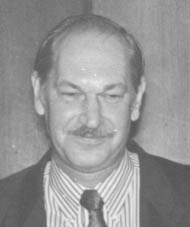The Private Sector Commis-sion (PSC) yesterday called for compromise instead of “dog-fighting” among the parties in the National Assembly, even as Speaker Raphael Trotman played up the 10th Parliament as one that would be the most productive and cooperative.
PSC representatives yesterday expressed concerns about what is happening in Parliament and called on all political parties to work together in the interest of the country and its people.

President of the Georgetown Chamber of Commerce and Industry (GCCI) Clinton Urling told a luncheon attended by members of the business community, Parliament and the diplomatic corps, that for any parliament to be truly effective, the custodians must embrace the spirit and willingness “to compromise for the good of our people.”
Urling said parliament must be seen as a reflection of the will of the Guyanese people. “In other words, the success of democratic politics ultimately depends on how our elected leaders govern and therefore inevitably on their attitudes towards compromise. Don’t be mistaken—compromise is difficult but governing a democracy without compromise is impossible and systemic rejection of compromise is a problem to any democratic society because it biases the political process in favour of the status-quo and stands in the way of desirable change,” Urling said.
Trotman, who was asked to address the luncheon following concerns raised by members at the PSC’s last executive meeting, admitted that there are issues in parliament since the government has not accepted that there has been a change of reality and the opposition still needs to understand that it is not the government. Nonetheless, Trotman, who called on the PSC to play its part in the success of the parliament’s work, was greatly optimistic about the success of the 10th Parliament, which is the first in which no party has a majority of seats and the government is the minority.
Dog-fighting
According to PSC Chairman Ronald Webster, at the commission’s last executive meeting its members expressed concerns on the status of parliament and the “apparent dog-fighting” going on.

He said the concern was expressed in the backdrop of the worsening global economic situation and that the situation from January 1 next year could be very difficult. He said the commission is concerned about the country’s economy being protected and wants Members of Parliament to focus on the future rather than the past.
At the meeting, it was decided that the PSC would engage Trotman and also talk to both sides of the House, so that they could understand their position. Following discussions with Trotman, yesterday’s luncheon was set up.
Webster stated that 70% of the country’s economy is driven by the private sector and its views need to be taken seriously. “Parliament is entrusted with the power to make and change laws for the good governance of the country, subject to the assent of the president,” he noted.
However, he said during the last session of parliament, “inadequate… legislative work was done.”
“Motions need to be well-based, impartial and in the interest of the country. Motions need to be supported by properly thought out and articulated bills, which are reasonable and speak towards substantive improvement to our way of life,” he charged.
Parliament needs to be cognizant of the needs of the country and its citizenry, Webster also said.
Some of those needs, he noted, include tax reform, local government reform to enable local government elections, adoption of new civil procedure rules for the High Court, and laws to govern professional conduct and liability for attorney, medical practitioners and auditors. He said although there is a Consumer Protection Act, there is still need for the laws to regulate certain industries for the benefit of consumers and there is need for a well equipped trade school.
“…There must be a way to put national interest above political agendas,” Webster said, while adding that the priority of the National Assembly is to do what is best in the interest of the people of Guyana. “We must measure the reasonableness of all political players from the act of walking out of parliament to the act of non-assent to bills. If the present showdown is allowed to continue, we would effectively be in a parliamentary lockdown,” he warned.

Webster also said the poor image that parliament has projected has not gone unnoticed by borderline unemployed persons. “And what amazed me was that the research we did we found that in every single instant where…the National Assembly was in conflict, there was civil unrest, take this very seriously,” he said.
He said that Trotman holds the keys to unlocking the situation and all eyes are on him.
Challenges
For his part, Trotman said there are many challenges in a scenario where no one party has a majority of seats and “where there are ever present fears and suspicions and where government has still not made the mental adjustment to the reality that things have changed and where the opposition is still to understand that it is not the government and to measure and quantify its own limits and extent of its own power.”
He pointed out that parliament is made up of the Executive and the National Assembly, as described in Article 51 of the Constitution, and he said the two were meant to work in tandem with and not in trepidation of each other “as we see on increasing bases.”
“Much of this has to do with the fact that the executive, in my opinion… has been unable to resist the urge in seeing the National Assembly as an extension of itself. The 10th Parliament is a melting pot of excitement, providing great amount of confusion at times, tumult and uncertainty,” he added.
However, Trotman believes these are necessary ingredients for revolutionary change and transformation. “In a situation such as this the Constitution of Guyana and the rules of procedures of the National Assembly are the only guidepost we must use to take us through this arduous course and, if I may add this, of course the requisite levels of willingness and patriotism to put Guyana first,” he said.
In the midst of all that is happening, an optimistic Trotman said he sees tremendous possibility for growth and development and predicted that the 10th Parliament will be one of the busiest and most productive and cooperative of all.
He said there is greater chance of a long lasting fundamental change that will come, as all in parliament are gravitating to the realization that the power they hold is “like a sacred trust that has to be held and utilized responsibly and that, in the context in Guyana, it must be distributed in such a way that it can only be unleashed when that responsibility is exercised by us working together.”
Trotman noted that there are many hopes and expectations and sometimes they coincide and other times they collide.
“There are expectations of the government, there are expectations of the singular and opposition parties, expectations of the friendly states and financial institutions that supports us, expectations of the Speaker but not least of all expectations of the people as to what should be the product and outcome of the 10th Parliament,” Trotman said.
He added that the National Assembly must give due recognition to Article 30 of the Constitution, which mandates an inclusionary democracy and which he interprets to mean not serving the interest of one, two or three parliamentary parties only, but that of the citizens to ensure that they all have full participation in the decision-making process.
It is his opinion that in the context of a multi-cultural ethnic, religious and diverse Guyana, the National Assembly “can be the central hub from which democracy spokes radiate outward.”
He said that the National Assembly can also be used as a bridge between the varying competing political forces and a place they can co-mingle, reconcile differences and find points of convergence for the greater national good.
“It is known that I am passionate about healing, about reconciliation and cooperation in the political sphere and I would use every ounce of energy and influence to forge these even if I am attacked for doing this,” he said.
He issued a call to the private sector to become involved as partners in “Guyana’s exciting journey and transition” and he said this can start by writing to be permitted to appear before parliament’s four sectoral committees–economic services, social services, national resources and foreign relations. He said all of the committees impinge on the private sector’s activities in direct ways and they cannot effectively function and produce anything without hearing from the private sector.
He also suggested an annual private sector/parliament engagement.
In his address, Trotman commended business persons, saying anyone doing business in Guyana should be given a medal of honour for surviving in the midst of a heavy tax burden, corruption, an unlevel playing field, high rates of crime, a lame legal system and a perplexing parliament.
The only time members of the audience applauded during his speech was when he mentioned the word corruption.
Independence
During the question and answer segment, which saw none of the business persons except Urling asking a question, US Ambassador Brent Hardt asked about the bill on parliamentary independence, its background, what that seeks to achieve and where it stands.
The Office of the Clerk of the National Assembly Bill 2012 was tabled by APNU frontbencher Volda Lawrence earlier this year and it is set to be debated on November 8.
Trotman recalled that in 2005 the government brought in an expert—Sir Michael Davies—to do a complete review of the parliamentary system and there was a similar review done by a consultancy firm from New Zealand and they both recommended that parliament be delinked from the executive, with its own budget and the right to hire and dismiss staff as an independent authority. He said there is need to modernise parliament and it is hoped that the bill would get the support and so far they have not heard whether the government will support it.
Meanwhile, Urling asked Trotman to share his view on Monday’s tied vote on the motion by the opposition to establish the independence of the Parliament Office, due to the absence of two opposition members of parliament and one from the government.
Trotman said the tied vote does not defeat the effort as the recommendations out of the 2005 Davies’ review and another way has to be found for them to be implemented. He said there was unanimity in the 9th Parliament in having the reforms implemented and he now has his work cut out in finding consensus on the process.
Urling also asked him to share his views on the judiciary pronouncing on decisions emanating from parliament and to this Trotman said it “is unprecedented for the Speaker and the Leader of the Opposition to be taken to court not once, not twice but thrice.”
He said on the one hand, the country’s jurisprudence is growing and developing but on the other hand there is a view that it erodes the independence of the legislature.





